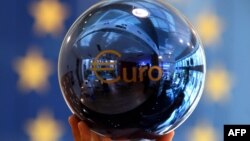As European leaders return from summer holiday to hold their first summit amid multiple international crises — in Africa, the Middle East and Ukraine — the bloc's two economic heavyweights, France and Germany, are also emerging as the EU's foreign policy leaders.
Instead of competing for primacy, experts say Paris and Berlin are helping to craft a more concerted EU diplomacy.
Little seems to be going right these days for France's embattled President Francois Hollande — except for the country's foreign policy, that is.
After launching military operations to tamp down violence in Mali and the Central African Republic, the French government has now set its sights on the Middle East. This month it prodded European foreign ministers away from their vacations and back to Brussels, where they agreed on arming Kurdish forces in Iraq who are fighting Islamic State insurgents.
Paris also acknowledged having sent weapons to Syria's opposition and opened its doors to Iraqi Christian refugees. Now Hollande is pushing to host an international conference on terrorism next month.
Addressing French ambassadors in Paris, President Hollande said France is acting on many foreign policies, both diplomatically and militarily. On Syria, for example, he said France had been right in pushing for military action last year against the Syrian regime.
In a commentary earlier this year, former French diplomat and deputy U.N. peacekeeping chief Jean-Marie Guehenno said France seems to be one of the few European Union countries that still has foreign policy ambitions. Other European countries seem to be looking inwards, he said, and abandoning the idea of trying to shape today's world.
But one other European country is looking outward: Germany has taken the lead in trying to defuse the Ukraine crisis and, in a break from post-war diplomacy, agreed to send weapons to Iraq.
According to Edouard Tetreau, director of the Paris office of the European Council on Foreign Relations, the region's two economic heavyweights and former foes may be key to crafting a more concerted EU foreign policy.
"It is about a shared interest," said Tetreau. "It's also about [Foreign] Ministers [Laurent] Fabius and [German Foreign Minister Frank-Walter] Steinmeier wanting to make sure that European diplomacy moves ahead in the right direction. It's not about rivalry, it's about closer and closer cooperation."
The two countries have carved out separate but seemingly complementary spheres of influence in addressing current conflicts. It's not surprising, says Steven Ekovich, international politics professor at the American University of Paris, that Germany has taken a leadership role on Ukraine, spearheading the push for tougher EU sanctions on Russia.
"There's no way that France can play a more important role in Ukraine than Germany, or in Russia for that matter. Germany is their backyard - or make that their front yard," stated Ekovich.
France's backyard is sub-Saharan Africa.
"There, France takes the lead. They should take the lead. They have a responsibility to take the lead when it's a question of humanitarian intervention," Ekovich noted.
In the Middle East, France has marked a U-turn from its 2003 opposition to the American-led invasion of Iraq. Last year — under a starkly different landscape — it pushed for airstrikes against the government of Bashar al-Assad in neighboring Syria. President Hollande has acknowledged it has also armed the country's moderate opposition.
Today, it is also sending weapons to Iraqi Kurds.
For Tetreau, France "got it right" both a decade ago — and today.
"This is not about luck or bragging about diplomatic moments. It is about intelligence on what is happening on the ground. It takes decades of presence on the ground and understanding what is happening in the region to get it right," he said.
In some areas, French and German national interests are converging. Paris estimates hundreds of its citizens have joined jihadists in Iraq and Syria, posing a security threat back home when they return. It's a fear shared by Germany, and helped shape Berlin's decision to arm Kurdish forces fighting the Islamic State.
On some basic issues, Paris and Berlin remain far apart. Hollande is weak at home while German Chancellor Angela Merkel is strong. France has long balked at Germany's tough austerity prescriptions for Europe. But this year, Hollande revamped his economic policies, embracing some of the belt-tightening measures. That turnaround helped fuel this week's overhaul of the French government — and, some observers say, may strengthen Germany's stature in Europe against a weakened France.




